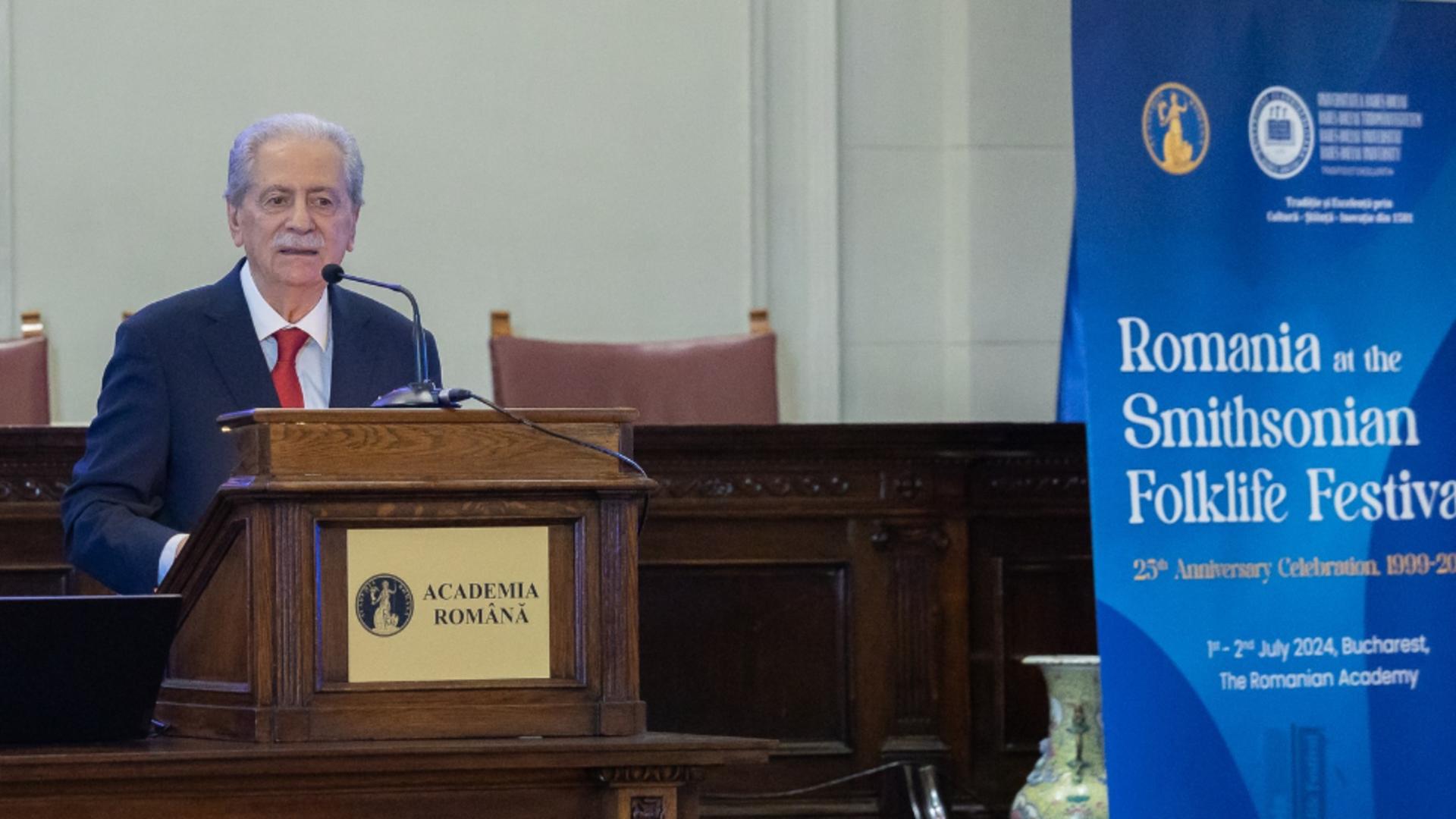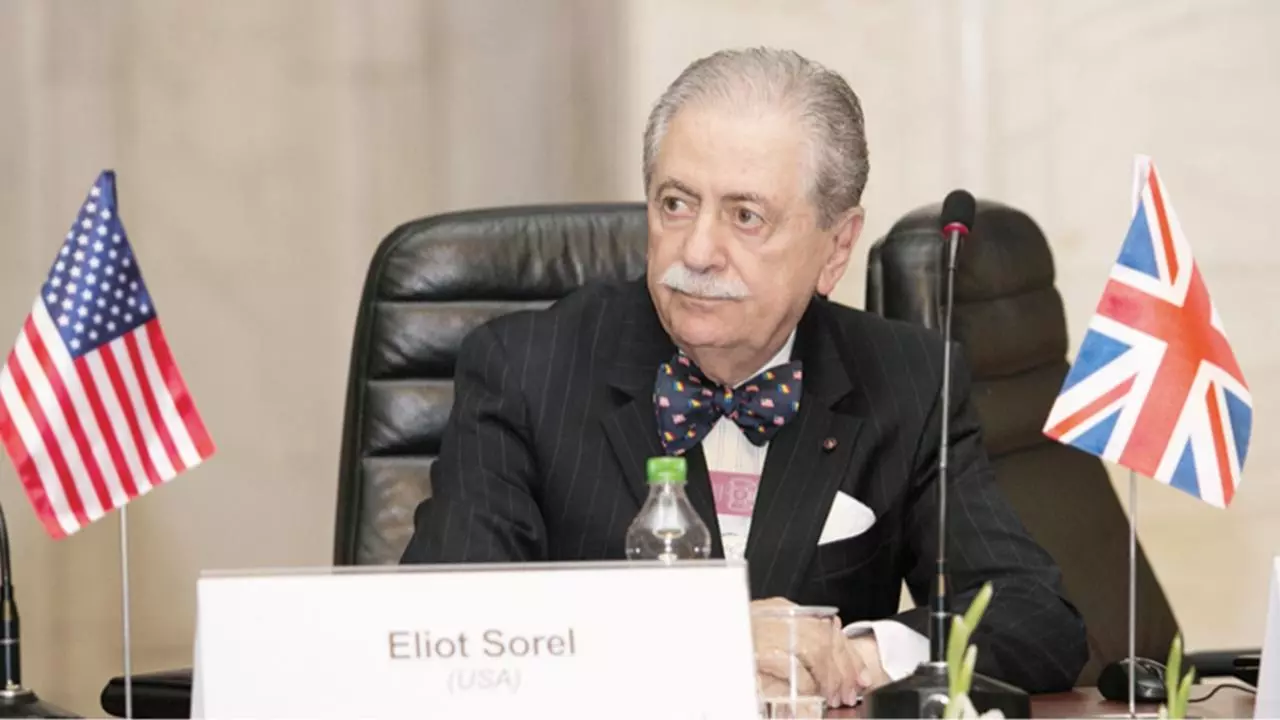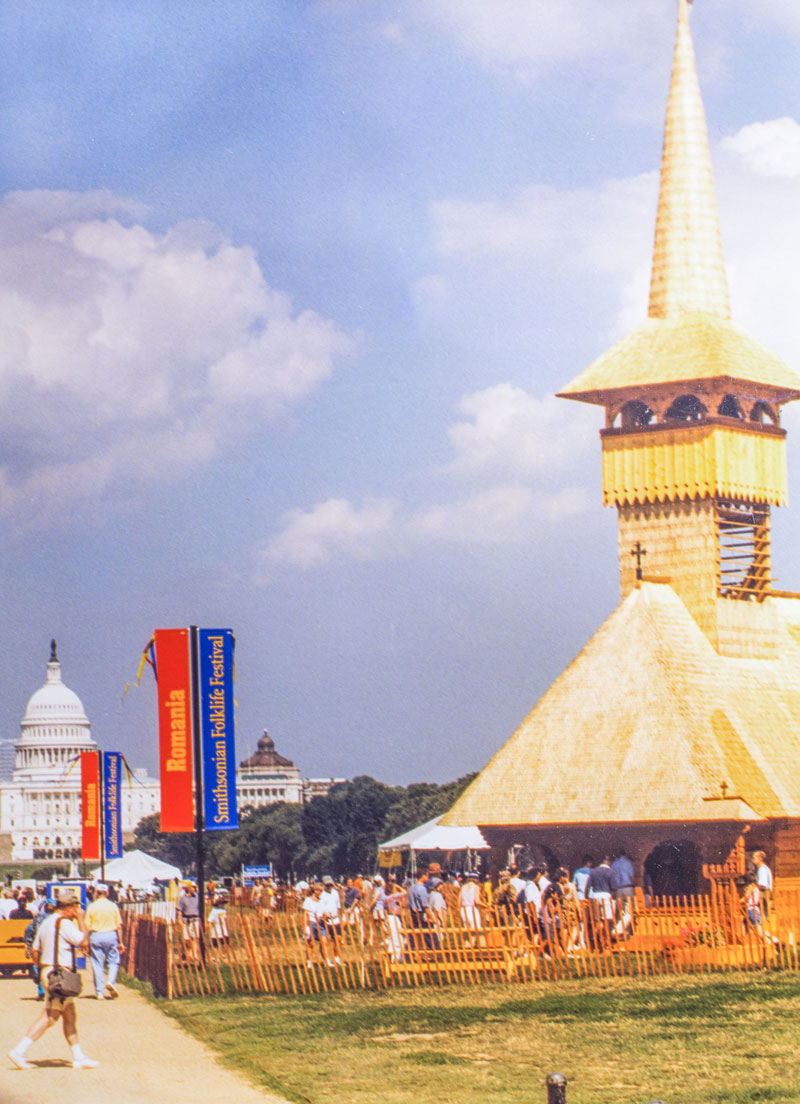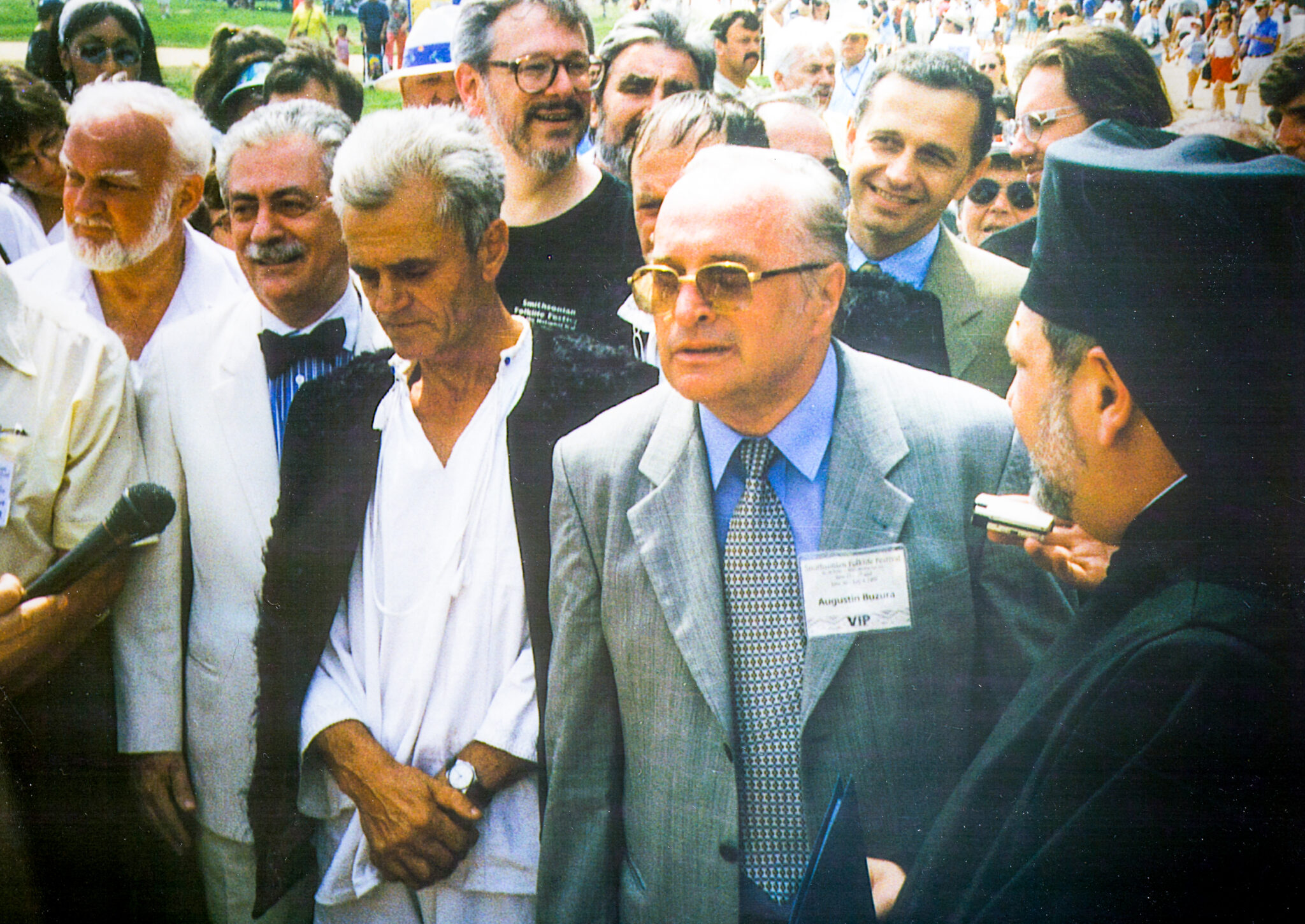by Ambassador James Rosapepe
Romanians of Washington, DC was deeply saddened to learn of the passing of Dr. Eliot Sorel on October 13, 2024. He was a practicing physician, a Clinical Professor of Global Health, Health Policy and Management, and of Psychiatry and Behavioral Sciences at George Washington University, as well as a key member of our Romanian-American community. You can read his full obituary here.
Dr. Eliot Sorel was the recipient of our 2021 Romanians of DC Community Award, award presented ”for his crucial role in bringing Romania to the 1999 Smithsonian Folklife Festival and his continued service to the community.” This project was initiated by Dr. Sorel in the summer of 1997 in collaboration with Academician Augustin Buzura, President of the Romanian Cultural Foundation. Under the theme “Romania – Open Gates,” Romania’s presence, highlighted by a church built by craftsmen from Maramureș, music and dance, culinary traditions, etc., attracted over 1,100,000 visitors. Approximately 40,000,000 people learned about Romania through the subsequent media coverage. Earlier this year, the Romanian Academy, in partnership with Smithsonian Institution and Babeș-Bolyai University hosted an ample 25 year anniversary event in Bucharest which included a concert at the Romanian Athenaeum, featuring performances of compositions by George Enescu and George Gershwin and a formal presentations at the Academy.

Upon hearing of Dr. Sorel’s passing, James Rosapepe, former U.S. Ambassador to Romania and current Chair of Alianța, the national organization of Americans, U.S. companies and other institutions working to strengthen cultural, economic, and security ties between the United States and Romania, shared with us the following reflection. His email further highlights the profound impact of Dr. Sorel’s efforts to bring Romania to the Smithsonian Folklife Festival and its significance in U.S.-Romania relations.
Dr. Eliot Sorel’s passing is a personal sadness for me and my wife Sheilah — and a great loss for America and for Romania. But his life was a great success for both. He was a one man band for the U.S. – Romania Strategic Partnership. And his instrument was cultural diplomacy.

Here’s the backstory.
Romanian President Emil Constantinescu told me one night in 1999 when the war in Kosovo started that, for the first time in the 20th century, Romania would stay on the same side of the war at the end as it had been at the beginning. That had not been the case in World Wars I and II
When and where did he tell me that? At a gathering in Bucharest to raise funds for Romania to participate in the Smithsonian Folklife Festival. And he was right: Romania’s steadfast support for NATO’s action led UK Prime Minister Tony Blair to lead Romania into the European Union and U.S. President George W. Bush to support Romania’s entry into NATO.
Was the timing of President Constantinescu’s comment to me a coincidence? Of course. But a dramatic example of how cultural diplomacy, military action, and political diplomacy are synergistic, not antithetical.
Cultural diplomacy is indispensable.
People are people. We’re not just nations, we’re not just military powers. We’re not just consumers and producers. We’re people.
That’s why Romania’s participation in the 1999 Smithsonian Institution Folklife Festival was so important.
Since the overthrow of Nicolae Ceau;escu’s Communism in 1989, Romanians yearned to join NATO and become allies of the United States and Europe. The biggest obstacles in the West were concerns that Romanians didn’t share our values — and, as importantly, that we didn’t feel we knew them very well.
As I was preparing for my confirmation hearing to become ambassador, my friend Ron Asmus, who was U.S. Deputy Assistant Secretary of State for European Affairs, and one of a handful of U.S. champions of expanding NATO, warned me of what he saw as one of Romania’s biggest challenges: to too many Americans, Bucharest just didn’t feel like a NATO capital. I was stunned, because Bucharest had been the Paris of the East before World War Two. And France was the founder of NATO! But people making American policy in the late 20th century had barely been alive before World War II. If they’d noticed Romania at all, it was all about Ceaușescu, Communism, overbuilt industries and grim shortages. Not a great brand for NATO’s next member. On reflection, I thought Ron’s point was both shallow (if someone wants to be your friend, say yes!) — and insightful (All of us don’t know who and what we don’t know.)
Dr. Eliot Sorel understood all this and had a big idea: Celebrate Romanian culture on the Washington Mall at the Smithsonian Folklife Festival. As soon as I was nominated to be U.S. ambassador to Romania, Eliot came to see me and pitch his idea. What Eliot understood was that Romania has lots in common with United States — particularly religion but also music, food, and drink, the universal lubricants. They and we just needed to promote them. That was the Folklife Festival.
The Smithsonian Folklife Festival, launched in 1967, already had been attracting hundreds of thousands of visitors for decades. Each summer it spotlights cultures of foreign countries as well as states.
All we needed were Romanian partners — and money. The Romanian Cultural Foundation, led by Augustin Buzura, was on board to get the Romanian partners. And the money? Radu Florescu, the American scion of centuries of Romanian leaders and then the CEO of one of the biggest Romanian communications firms, went into action. The result? OMG!
Craftsmen and dancers from Maramureș and all over Romania descended on the Mall. Romanian delicacies like sarmale melted into American mouths. The first church on the Washington Mall in American history.
I wasn’t surprised that curators of the festival insisted on moving a real Maramureș wooden church to Washington. The architecture is iconic – and breathtaking: thousands of delicate shingles covering sides and spires that stretch toward heaven. Part of a what made it so exciting was that the U.S. Embassy was able to issue visas for Romanian woodworkers to come to Washington to reassemble the church. (This was before Nine-Eleven triggered a crackdown on visa policies.). After the Festival, the church was disassembled and transported to Chicago, and is now the home of a Greek Catholic congregation there.

Among the Romanians who understood the opportunity all this presented was Foreign Minister Andrei Pleșu. Of course he did! He was one of a handful of Romania’s top intellectuals — and an art historian to boot. He is an expert on angels in art, a specialty which helped him sidestep confrontations with Communist officials over religion or philosophy. (There were plenty of other confrontations.) Pleșu came to Washington for the festival and tied it into meetings with the U.S. Department of State on NATO. No kidding!

With about a million visitors every summer, the festival is the World Series of folk culture in the United States. And in 1999, Romania was in the playoffs, along with South Africa and New Hampshire. Why does that make a difference? Because the governor of New Hampshire in 1999 was Jeanne Shaheen, now a member the US Senate Foreign Relations committee and the cosponsor, with Utah Senator Mitt Romney, of the Black Sea Security Act. I first met Senator Shaheen at the Folklife Festival. As Romanians constantly remind us, it’s all about connections.
Would Romania have gotten into NATO if it hadn’t been part of the Smithsonian Festival in 1999? Yes. The fundamentals of their sprint to democracy were strong enough. Did the Festival on the Mall make that easier for Americans? Absolutely! As I like to say on any issue in the U.S. or elsewhere: “We can do it the easy way or the hard way; I prefer the easy way. But we’re going to do it.” Eliot Sorel’s vision of Romania’s participation in the Smithsonian Folklife Festival in 1999 helped make it the easy way.
